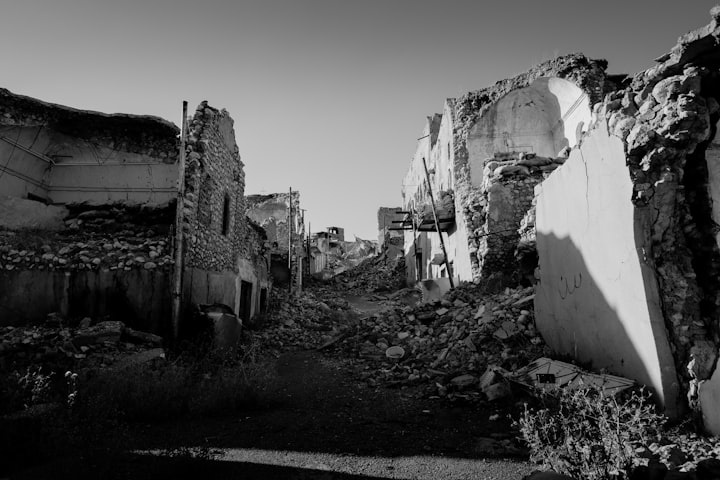Understanding the Rise of Al Qaeda: Historical Context and Contributing Factors
Analyzing the Impact of the Global Terrorist Organization's Actions on the World and the Ongoing Fight Against Terrorism

The terrorist group Al Qaeda was established in the late 1980s by Osama bin Laden, a Saudi Arabian millionaire. The group initially began as a resistance movement against the Soviet occupation of Afghanistan, but eventually evolved into a global terrorist organization responsible for some of the deadliest attacks in history. In this blog post, we will examine the factors that led to the rise of Al Qaeda and the impact of its actions on the world.
Historical Context
The roots of Al Qaeda can be traced back to the 1980s when the Soviet Union invaded Afghanistan. The United States saw this as an opportunity to weaken the Soviet Union and provided financial and military support to the Afghan resistance. This support helped the resistance forces, known as the Mujahideen, to defeat the Soviet forces.
The United States’ support for the Mujahideen, which included Al Qaeda members, played a significant role in the formation of Al Qaeda. After the Soviet Union’s withdrawal from Afghanistan in 1989, the Mujahideen became the dominant force in the country. However, the absence of a central government led to infighting among the various Mujahideen factions. Osama bin Laden, who had become a prominent figure among the Mujahideen, saw an opportunity to unite these factions and form a new organization.
Formation of Al Qaeda
In 1988, bin Laden formed Al Qaeda, which means “The Base” in Arabic. The organization’s goal was to unite Muslims around the world and create a global Islamic state. The group saw the United States and its allies as a threat to this goal and declared war on them.
The early days of Al Qaeda were marked by a focus on Afghanistan and the broader Muslim world. The group established training camps in Afghanistan and trained militants in guerilla warfare, bomb-making, and other tactics. Many of these militants went on to fight in conflicts in Bosnia, Chechnya, and other parts of the world.
Al Qaeda’s first major terrorist attack was the 1993 World Trade Center bombing. The attack, which killed six people and injured over a thousand, was carried out by a group of Islamist militants, one of whom had been trained in an Al Qaeda camp in Afghanistan.
After this attack, Al Qaeda continued to grow and expand its reach. The group carried out a series of attacks in the late 1990s, including the 1998 United States embassy bombings in Kenya and Tanzania and the 2000 attack on the USS Cole in Yemen.
September 11 Attacks
The September 11 attacks, which killed nearly 3,000 people and injured over 6,000, were the most significant and deadliest attacks carried out by Al Qaeda. The attacks were carried out by 19 militants, most of whom were from Saudi Arabia. The group hijacked four commercial planes and crashed two of them into the Twin Towers of the World Trade Center in New York City. Another plane was crashed into the Pentagon, and a fourth crashed in Pennsylvania after passengers attempted to retake control of the aircraft.

The impact of the September 11 attacks was felt around the world. The attacks led to the United States’ War on Terror and a massive increase in security measures around the world. The United States and its allies launched military operations in Afghanistan to overthrow the Taliban government, which had provided a safe haven for Al Qaeda. The group’s leaders, including Osama bin Laden, were targeted and killed in drone strikes and other military operations.
Factors Contributing to the Rise of Al Qaeda
There were several factors that contributed to the rise of Al Qaeda. These factors included:
The Soviet Invasion of Afghanistan
The Soviet invasion of Afghanistan was the catalyst for the formation of Al Qaeda. The United States’ support for the Mujahideen, which included Al Qaeda members, played a significant role in the formation of the organization. The Afghan conflict created a network of militant groups, many of which were trained and supported by the United States and other Western countries. This led to the creation of a large pool of experienced and battle-hardened militants who later went on to join Al Qaeda.
The Role of Religion
Religion played a significant role in the rise of Al Qaeda. The group’s ideology was based on a strict interpretation of Sunni Islam, and the group saw itself as a defender of Islam against Western imperialism. Al Qaeda used religious rhetoric to recruit members and justify its attacks, portraying the United States and its allies as enemies of Islam. The group’s leaders believed that the only way to create a global Islamic state was through violent means.
The Failure of Moderate Islamism
The rise of Al Qaeda can also be attributed to the failure of moderate Islamist movements to gain power in the Muslim world. In countries like Egypt, Algeria, and Saudi Arabia, Islamist movements that sought to gain power through peaceful means were often suppressed by authoritarian regimes. This led to the radicalization of many Muslims who saw violent jihad as the only means to achieve their goals.
Globalization
The rise of globalization played a role in the rise of Al Qaeda. The spread of Western culture, values, and political systems across the world was seen by many Muslims as a threat to their traditional way of life. Al Qaeda saw globalization as a tool of Western imperialism and used it as a justification for its attacks.
Arab-Israeli Conflict
The Arab-Israeli conflict was another factor that contributed to the rise of Al Qaeda. The ongoing conflict between Israel and the Palestinian people has long been a source of tension in the Middle East. Al Qaeda used the conflict as a rallying cry, portraying itself as a defender of the Palestinian people and calling for the destruction of Israel.
Impact of Al Qaeda’s Actions
The impact of Al Qaeda’s actions has been significant and far-reaching. The group’s attacks have led to the deaths of thousands of people and have caused significant economic and social disruption. The group’s tactics, which include suicide bombings and other forms of terrorism, have become a hallmark of terrorist groups around the world.
The September 11 attacks had a profound impact on the United States and the world. The attacks led to a massive increase in security measures and the United States’ War on Terror. The war, which began with the invasion of Afghanistan, has since expanded to other parts of the world, including Iraq, Syria, and Yemen. The war has led to the deaths of hundreds of thousands of people and has caused significant social and economic disruption in these countries.
Al Qaeda’s attacks have also had a significant impact on the Muslim world. The group’s ideology and tactics have been criticized by many Muslim leaders, who have denounced the group’s violent approach to achieving its goals. The group’s attacks have also led to increased Islamophobia around the world, with many people associating Islam with terrorism.
The rise of Al Qaeda was a complex and multifaceted phenomenon that was the result of several factors, including the Soviet invasion of Afghanistan, the role of religion, the failure of moderate Islamism, globalization, and the Arab-Israeli conflict. The group’s attacks, particularly the September 11 attacks, have had a profound impact on the world, leading to significant social, economic, and political disruption. The fight against terrorism continues to this day, and it remains to be seen what the ultimate outcome of this conflict will be.
Be sure to check out and share my other essays which can be found in my Vocal profile by clicking HERE and be sure to find me/tag me by clicking the links below for Twitter (@larrymlease) and Instagram (larrymlease).
About the Creator
Lawrence Lease
Alaska born and bred, Washington DC is my home. I'm also a freelance writer. Love politics and history.






Comments
There are no comments for this story
Be the first to respond and start the conversation.